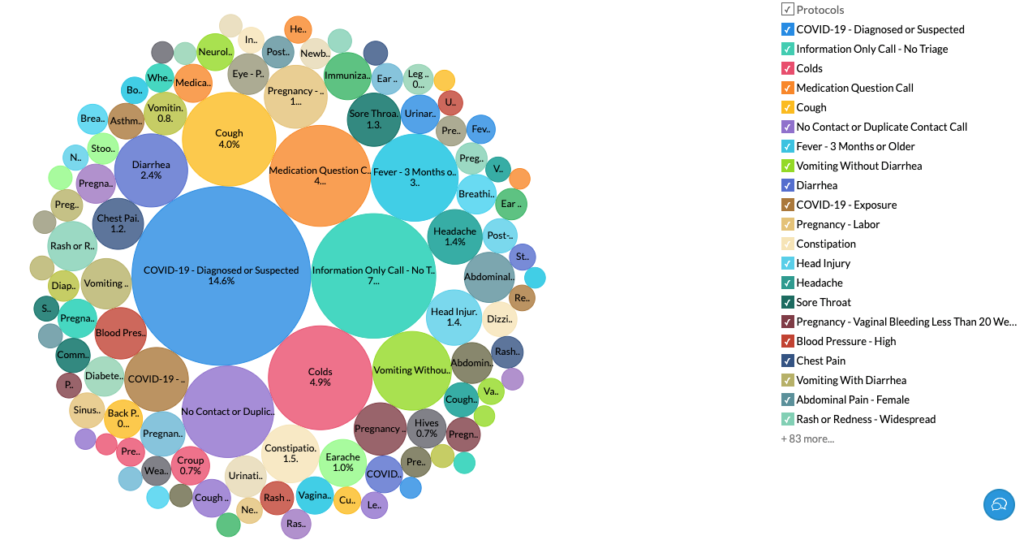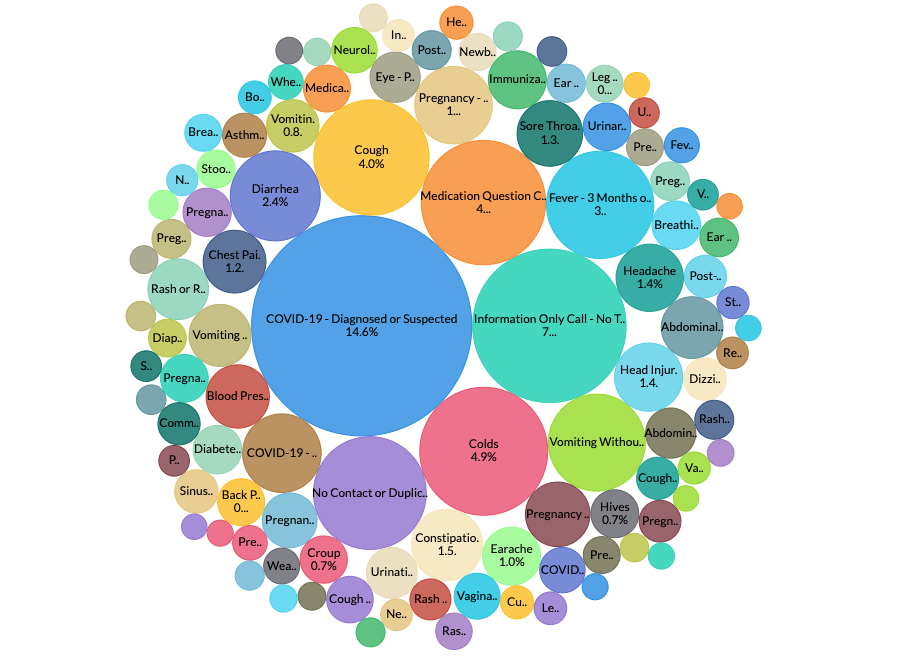Patient calls regarding COVID-19 have reached or exceeded what triage nurses experienced at the very beginning of the pandemic. This is due to the prevalence of the Omicron variant which overtook Delta before the holidays, and has since escalated anxiety and fear due to its high transmissibility even among the vaccinated. Hospital systems are already stressed in many states, says NPR, “where the number of people … with COVID-19 have exceeded or are nearing previous highs.” This underscores just how important dedicated telehealth triage nurses are in managing this influx of calls, offering dispositions on care, and referring those seeking information to the most credible sources.
By the Numbers
Consider this example from one of our hospital affiliates in North Carolina. Out of all of their calls to our nurse triage line, those focused on diagnosed or suspected cases of COVID came highest at 14.6 percent. The second highest were those seeking information only, before reaching more seasonal health concerns like colds, medication questions, and cough.

COVID or Cold?
Adding to patient anxiety is the fact that the Omicron variant tends to target the upper respiratory tract rather than the lungs, which results in symptoms that are more commonly associated with colds, like headaches, coughing, and sore throats. These can also be less severe in those who are vaccinated versus those who aren’t, leading to confusion for patients as to whether they have COVID, and if they should get tested — especially when testing centers are full, or ERs become overrun.
What Telehealth Triage Can Offer
The chart above emphasizes two key needs: first, that nurses have the most up-to-date COVID information available to answer caller questions and triage patient symptoms; second, that there are enough available nurses to prioritize callers and avoid any delays in care — whether or not that care is COVID-related.
For the first need, your team can utilize updated nurse triage protocols that address COVID-19 and its variants. These were developed by Drs. Schmitt and Thompson and are periodically revised by a group of healthcare professionals. You can also implement our Protocol Editor to create customizable paths to patient care using the proper change management.
For the second need, you can outsource your nurse triage to our call center. Our team of RNs will act as an extension of your practice, using specialized instructions and customized protocols to address patient concerns and empower them with knowledge. Our nurses can provide brochures to those patients who are simply seeking information, and refer them to credible healthcare agencies with the latest COVID data. This reduces the amount of time required to address their concerns, and allows our nurses to focus on callers who are exhibiting more immediate symptoms.
After-Hours Care
After-hours care is just as important — if not more so — for patient callers who are worried about their symptoms. If your office closes by five, outsourced telehealth triage nurses can be a valuable resource to engage with your patients and address their questions 24/7. This relieves your daytime staff from having to prioritize the number of after-hours calls and voicemails to return, and establishes a continuity of care between our triage software and your in-house medical records.
In spite of the recent spread of the Omicron variant, TriageLogic remains hopeful that this surge will soon pass. As always, we remain dedicated to helping those hospitals, practices, and healthcare organizations that need the latest nurse triage and telehealth technology to get their patients to the most appropriate levels of care and improve their health outcomes. Contact us to learn how TriageLogic can help your patients and your doctors.
About TriageLogic
TriageLogic is a URAC-accredited, physician-led provider of top-quality nurse telehealth technology, remote patient monitoring, and medical call center solutions. Founded in 2007, the TriageLogic Group now serves more than 9,000 physicians and covers over 25 million lives nationwide.





